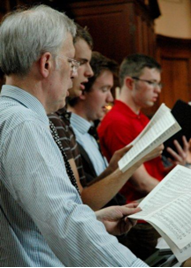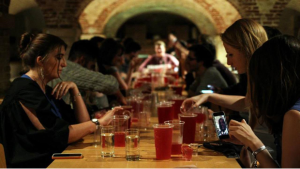Bridging Worlds Through Music
Whether in a concert hall, cathedral, or cabaret, Chicago a cappella makes incredible music. My name is Alan Taylor, and I am a new tenor in Chicago a cappella. My first performance with the group is coming up in April. But before then, I’m excited about hearing the Cambridge Concert, which looks like it will be perfect for newcomers and seasoned listeners alike. I’m looking forward to it because no matter how I define “English choral music,” I’ve learned that there’s always more to discover just beneath the surface.
“Upstairs, Downstairs” is a British TV show about a rich family and their servants—think Downton Abbey, but filmed in the 70s. “Upstairs, Downstairs” also describes one way that I discovered life is full of twists and turns, and that music can bring them together.
My Cambridge Story

Ever felt out of place, then suddenly right at home? That was me in Cambridge one warm summer afternoon. As I strolled towards Clare College, I was eager to sing with their choir for Evensong. Crossing the bridge over the River Cam, I marveled at the buildings around me—many predating the United States. That was hard to wrap my mind around, because, at 19 years old, my top priority was the upcoming release of the iPhone.
As I found my seat, the other members of the choir greeted me in their “gowns” or Cambridge uniforms. I started to feel a little out of place because of my southern accent and the Abercrombie & Fitch polo I was wearing. Thankfully, the other tenors quickly made me feel welcome and helped me find a robe.
I had practiced my music and marked my scores, but putting it all together was surprisingly meaningful. The interesting harmonies brought the words to life. The way that the congregation sang with the choir at some points made me feel like I was “a part” of something special.

After the service, my new Cambridge companions extended an invitation to join them at a nearby bar. I explained that I needed to stay nearby, but one of them said, “It’s only about 10 feet below us. The pub is downstairs, right under the high altar!”
Lo and behold, the most famous (and affordable) bar at the University of Cambridge is in the crypt under Clare Chapel. Heading downstairs felt like stepping into a completely different world. The lingering incense from the chapel changed to the smell of books, beer, and cold stone. The pub buzzed with study groups, friend groups, and the choir members.
I was “enamoured” with my new friends as we laughed about how different British and American English are. ”Biscuit” means something entirely different across the pond. And don’t even get me started on ”rocket” or “pants.”

As a few more pints were enjoyed, the room’s energy shifted. As if on cue, the crowd erupted into a rousing chorus: “And I would walk 500 miles, and I would walk 500 more…” I couldn’t help but notice how engaged everyone was, not just the musicians. Whether we were upstairs or down, group singing in England was not a spectator’s sport.
That day, I learned that different experiences can be found in the same place. Beneath the grandeur of English architecture or music, another world lies just beneath the surface.
About English choral music
When you listen to Anglican composers, you’re often on a rollercoaster of harmonies. From All Souls’ Day anthems to cheeky, fun songs, the program for Cambridge Concert looks to be a beautifully wild mix—and I love every bit of it.
The first half features mainly religious music about deep topics like faith and purpose. Composers like Byrd, Harris, and Stanford wrote some of the most intricate choral music ever for their churches. The second half boasts music that is perfect for a pub, party, or village festival.
But, to me, the key distinction between the program’s halves lies in your experience as a listener. I’m looking forward to encountering a range of emotions, from reverence to revelry. English choral music encompasses the full spectrum of human experiences. I love listening to it—and I know you will, too!
Program Highlights
Upstairs: Place of Holiness
- “Beati Quorum Via” by Stanford: The piece is about a spiritual journey, and Stanford nailed it. Starting with a single note, the motion and harmony grows from there. The interplay between high and low voices make this a piece that sticks with you, whether you’re in a church pew, a concert hall, or YouTube.
- “Sundowning” by Grace Brigham: The way Brigham sets text like, “As we recollect to the now, time stands still,” to music really gets you thinking. She’s able to capture the ups and downs of dementia in a way that’s honest, but also gentle.
Downstairs: Place of Happiness
- “Pastime with Good Company” by Henry VIII, arr. Geoffrey Shaw: The notorious king was also a talented athlete, poet, and musician. As a handsome, young prince, he wrote this song for his first (of six) wife, Catherine. It is so popular, he became a cultural icon across Europe and many people still sing it today. Picture it: Cambridge students floating on flat-bottomed boats belting this exact arrangement towards onlookers on the riverbank. That’s the spirit Chicago a cappella is bringing to their version: meaningful with a bit of whimsy.
- “The Ballad of Green Broom” from Five Flower Songs by Britten: This piece showcases Britten’s knack for telling stories through song. Older ballads like “Pastime with Good Company” would usually be accompanied by a lute. In this piece, the singers imitate the plucking strings as each section gets a chance to tell the story of a young, lazy, but memorable flower-cutter. As the tale unfolds, the music gradually speeds up. Buy your Cambridge Concert tickets today to see how the story ends!
